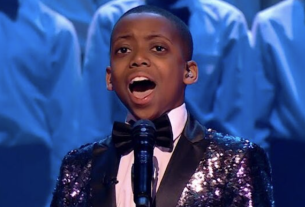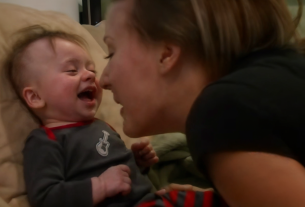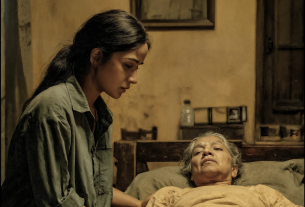Lera had always imagined her thirtieth birthday differently. As a child, she thought that by thirty she would have everything: a career, children, her own house with a garden and a white picket fence. Reality turned out to be more complicated and, at the same time, simpler. She had Maksim — a husband she had loved for eight years. She had a job that brought pleasure and a decent income, even if it was done on a computer at home rather than in an office with a nice view from the window. She had a two-room apartment in a good neighborhood, a gym membership, and weekly visits to a beautician.
The only things missing were children. And understanding from her family.
“Lera, seriously, let’s just do it without them,” she said to Maksim a week before her birthday, stirring her coffee and looking out at the October yard. “I want to celebrate quietly. With you, with Anya, with Dimka and Svetka. That’s all.”
Maksim looked up from his laptop. A spreadsheet with some numbers was open on the screen — he worked at an IT company, and his workday often began at home with morning coffee.
“They’ll be offended,” he said quietly.
“And I’ll be offended if they come,” Lera sat opposite him at the kitchen table. “Max, really. I don’t want to hear on my birthday about how it’s time for me to have children because ‘the clock is ticking.’ Or that freelancing isn’t work, just a pastime.”
Maksim closed the laptop. Lera saw him mentally weighing arguments — his own and hers, his and his parents’.
“Alright,” he said finally. “I won’t even tell them where we’re celebrating.”
“Really?”
“Really. I’ll say it’s a romantic evening for us.”
Lera walked around the table and hugged him by the shoulders.
“Thank you. I just want, for once, not to have to justify myself. Can I?”
“You can,” Maksim kissed her hand. “But we’ll still buy a gift for mom, right?”
“We will,” Lera laughed. “I’m not a monster.”
She chose the restaurant “Granat” for its coziness and proximity to home. A small place on the first floor of an old building, with wooden tables, dim lighting, and a menu without pretensions to haute cuisine, but with good steaks and homemade desserts. A place where you could sit for hours, no one rushing you, and you didn’t have to rush yourself.
Anya arrived first — a friend from university days, a witness at the wedding, someone who knew all of Lera’s secrets and never judged. She brought a huge bouquet of white roses and a box of macarons.
“Happy anniversary, old girl,” she said, kissing Lera on the cheek.
“You’re the old girl,” Lera replied. “You’re two months older.”
Dimka and Svetka came with Maksim — he had picked them up. Their families had been friends for about four years since they met at a mutual acquaintance’s birthday. Dimka and Svetka had a two-year-old daughter and were among the rare people who never suggested “you should have one too” or asked when they finally would.
“Lerochka,” Svetka hugged the birthday girl and handed her a small box. “These are earrings, I saw you looking at ones like this at Pandora.”
Lera opened the box. Stud earrings with small cubic zircons, simple and elegant.
“Sveta, thank you. They’re perfect.”
Dimka shook hands, Maksim ordered champagne, and they sat around a round table by the window. Rain drizzled outside, soft music played in the restaurant, and Lera thought this was exactly what she wanted. No fuss, no obligatory toasts or routine congratulations. Just people who loved her.
“To Lera,” raised Dimka’s glass. “May the next thirty years be even better than the first thirty.”
“To friendship,” added Anya.
“To love,” said Maksim, looking at his wife.
They clinked glasses, and Lera felt a warm calm spread inside her. This was happiness. Not loud or showy, but quiet and real.
They ordered salads and hot dishes, Svetka told a funny story about her daughter, Anya complained about her new boss, and Dimka planned a vacation. Ordinary conversations among ordinary people who knew each other well enough not to play roles.
“By the way, I’m thinking of taking some courses,” Lera said, cutting her steak. “Marketing, maybe. I want to develop.”
“Good idea,” Anya nodded. “I’m thinking about learning to be an SMM specialist. I’m tired of working just for a salary.”
“Lera is already doing great,” Maksim said. “So many projects completed this year.”
“Oh, stop it,” Lera blushed, but it felt nice. Maksim always supported her work and never considered it less important than his own.
They were finishing their second glass of champagne when the restaurant door opened and Maksim’s parents entered.
Inside, Lera felt everything stop.
Anna Sergeevna and Vladimir Petrovich stood in the doorway, looking around as if they had come to the wrong place. Anna Sergeevna wore her usual beige coat and an invariably displeased expression. Vladimir Petrovich held a huge, bright bouquet of gladioluses — totally out of place.
“So here you are,” Anna Sergeevna said, heading to their table. “Maksim, what kind of secrets are you keeping from your parents?”
Lera looked at her husband. Maksim sat with his eyes downcast, and she understood everything without words.
“Happy birthday, dear,” Vladimir Petrovich handed her the bouquet and kissed her cheek. The gladioluses smelled sickly sweet and artificial.
“Thank you,” Lera forced out.
“A strange place you chose,” Anna Sergeevna looked around the interior. “Some kind of dive. It’s a jubilee, you could have gone to a decent restaurant.”
Dimka and Svetka exchanged glances. Anya looked at her plate. Maksim was silent.
“Sit down,” Lera said, because she had to say something.
Anna Sergeevna sat next to her son; Vladimir Petrovich settled between Dimka and Svetka. The waiter brought two more sets of cutlery.
“Well,” Anna Sergeevna said as champagne was poured. “Let’s toast the birthday girl. May God grant her the most important thing in the coming year — maternal happiness. Thirty years is quite mature.”
Lera felt her mouth dry.
“Mom,” Maksim said quietly.
“What ‘mom’?” Anna Sergeevna looked at him in surprise. “Am I wrong? At your age, we were already raising you.”
“At thirty, we already had three children,” Vladimir Petrovich added.
“Times were different,” Svetka said quietly.
“Times, times,” waved Anna Sergeevna. “But biology is the same. The clock is ticking, no matter what.”
Lera clenched her fists under the table.
“By the way,” the mother-in-law continued, “who are these?” She nodded toward Dimka and Svetka. “Maksim, you didn’t introduce them.”
“They’re our friends, Dima and Sveta.”
“Ah, I see.” Anna Sergeevna gave them an appraising look. “And how do you know Lera?”
“Mutual acquaintances,” Dimka answered.
“Hmph. I thought you would invite Irochka Sokolova, remember, Maksim? Vladimir’s daughter. She’s Lera’s age, married, and already has two kids. Someone to talk to about family.”
“Mom,” Maksim said more firmly. “We wanted to celebrate with a close circle.”
“A close circle is family,” Anna Sergeevna cut in. “Not some… ” she glanced again at Lera’s friends.
“Anya is my best friend,” Lera said. “Since university.”
“Ah, student friendships,” Anna Sergeevna nodded as if she understood everything. “Well, of course. Where do you work?”
“At an advertising agency,” Anya replied.
“An office job?”
“Yes.”
“Good. Because our Lera sits at home, does something on the internet. I tell Maksim — that’s not work, that’s a pastime. You have to go to work, communicate with people, gain experience.”
Lera felt a familiar wave of anger rise inside her.
“Anna Sergeevna,” she said as evenly as possible. “I earn just as much as Maksim.”
“Money isn’t the main thing,” the mother-in-law waved it off. “The main thing is stability. Social benefits, vacation, sick leave. And what do you have? One day you have orders, the next you don’t.”
“I have regular clients.”
“Oh sure, sure. And then what? Some crisis, and you’re out of work. No, I don’t understand modern youth. Instead of focusing on family, having children, you go to gyms and beauticians. Money down the drain.”
“Mom, enough,” Maksim said.
“Enough what? Am I saying something wrong?” Anna Sergeevna spread her hands. “I only wish you well. Lera, you’re a pretty girl, but the years are passing. And it’s pointless to waste money on beauty if there’s no normal family.”
“We do have a family,” Lera said.
“What kind of family without children?” snorted Anna Sergeevna. “You’re playing at family. But family is responsibility, a full home, continuation of the line.”
Lera stood up.
“Anna Sergeevna,” she said, her voice trembling despite her efforts, “I ask you to leave the restaurant.”
Silence fell. Anna Sergeevna opened her mouth in surprise.
“What did you say?”
“I said — please leave.”
“Maksim!” Anna Sergeevna turned to her son. “Do you hear how they speak to me?”
Maksim sat without raising his eyes.
“Maksim!”
“I…” he finally looked at his mother, then at his wife. “I told them where we were celebrating.”
Lera felt her legs weaken.
“What?”
“Yesterday mom asked where we’d celebrate, and I… I couldn’t lie.”
“Maksim,” Lera said very quietly, “you promised.”
“Lera, why are you getting upset?” Vladimir Petrovich interrupted. “We came with good intentions, to congratulate.”
“What do you think you are?” Anna Sergeevna was outraged. “We’re parents! We have rights!”
“No,” Lera said. “You have no right to poison my birthday. You have no right to tell me how to live. And you,” she looked at her husband, “have no right to lie to me.”
“Ler,” Maksim began.
“No.” Lera took her purse. “Anya, let’s go.”
“Lera, where are you going?” Maksim stood up.
“You go to your mom,” Lera said. “Apparently, her opinion matters more to you than mine.”
“Lera!”
But she was already heading to the exit, and Anya hurried after her.
“That’s a snake,” Anya said when they got into the taxi. “Sorry, I don’t mean you.”
Lera laughed through tears.
“Don’t apologize. She really is a snake.”
“And Maksim…” Anya shook her head. “How could he?”
“I don’t know,” Lera looked out at the wet streets. “I thought he was on my side.”
“Men,” Anya philosophized. “They’re all mama’s boys deep down.”
“Where to?” the taxi driver asked.
“To the karaoke hall on Mayakovskaya,” Anya said without asking Lera.
“Right,” Lera nodded. “I want to scream.”
The karaoke was noisy, stuffy, and fun. Groups of students celebrated their own events, a couple in their forties sang a duet of “A Million Scarlet Roses,” and in the next booth someone was straining to sing Tsoi.
Lera and Anya rented a small booth, ordered wine, and started with “Happy Birthday.” Then they moved to Allegrova’s “Mad Empress,” then “VIA Gra,” then anything.
“You know what,” Lera said, finishing her third glass, “I think I’m happy.”
“From the wine?” Anya clarified.
“From freedom,” Lera took the microphone. “Ank, let’s sing ‘Murka’?”
“Let’s!” her friend laughed.
They sang “Murka,” then “Katyusha,” then “Evenings in the Suburbs.” Lera felt something lift from her heart with every song. Some burden she had carried without noticing.
Her phone buzzed nonstop with calls from Maksim, but she didn’t answer.
“Actually,” Anya said during a break, “think about it. Maybe it’s for the best?”
“For the best what?”
“All this. Maybe the universe is giving you a sign?”
“What sign?”
“That it’s time to change something. In relationships, in life.”
Lera twirled the microphone in her hands.
“You think I should get a divorce?”
“I think you should live for yourself. Then we’ll see.”
“He’s not bad, Maksim. Just…”
“Weak,” Anya finished. “Sorry, but it’s true. A good guy but weak. And as long as he hides under his mom’s skirt, nothing will change. And you can’t have kids with him because of that.”
Lera nodded. She understood that herself, just afraid to admit it.
“Let’s sing something funnier?” she suggested.
“Let’s sing ‘Let’s Drink to Love’!”
They sang until three in the morning. Then Anya went home, and Lera — to her apartment. Maksim waited in the hallway, sitting on a stool with his head in his hands.
“Ler,” he said when she entered. “Forgive me.”
“We’ll talk tomorrow,” Lera said tiredly. “I want to sleep.”
“Ler, please…”
“Tomorrow, Max. Tomorrow.”
In the morning they sat silently at the kitchen table with coffee. Outside, the October day was bright and cold.
“I didn’t want to,” Maksim said finally. “Mom asked, and I thought… what’s wrong? They’ll come, congratulate, leave.”
“You knew,” Lera said. “You knew perfectly well what they would do. And you said it anyway.”
Maksim nodded.
“Knew.”
“Why?”
He was silent for a long time, then sighed.
“Because I’m tired of lying to mom. Because it’s easier to agree than argue.”
“And isn’t it easier to argue with me?”
“With you…” Maksim looked at her. “With you, I thought you’d understand.”
“Understand what? That your mother is more important than me?”
“No. That… I don’t know how to stand up to them.”
Lera put down her cup.
“Maksim, I’m thirty. Not twenty, not twenty-five. Thirty. I work, earn money, pay for the apartment, buy groceries. I’m an adult woman. And I don’t want to prove my right to exist every day.”
“I understand.”
“No, you don’t. If you did, you wouldn’t have brought them yesterday.”
Maksim bowed his head.
“What do you want?”
“I don’t know,” Lera said honestly. “I’ll think.”
For three days Lera thought. Worked, met with Anya, talked to her mother on Skype — she lived in St. Petersburg and had long divorced her father, so she understood perfectly well that life could turn out differently.
“Lerochka,” her mother said, “don’t rush. And remember — you have the right to happiness. True happiness, not compromises for the sake of family peace.”
On the fourth day Maksim came home from work and said:
“I talked to my parents.”
“And?”
“I told them that if they ever insult you again, I will stop communicating with them.”
“Really?”
“Really. And I also told them we live as we see fit. We’ll have children when it happens. And this topic is delicate and private for us.”
Lera looked at her husband and saw he was serious.
“And what did they say?”
“Mom cried. Dad said I’m an ungrateful son.” Maksim shrugged. “But I’m tired, Lera. Tired of choosing between you and them. I choose you.”
“Better late than never,” Lera said and hugged him.
Maybe everything could still be fixed. Maybe yesterday’s nightmare was really a sign — not for divorce, but that it’s time to put things in order.
“Happy birthday,” Maksim said, kissing her temple. “I want all your birthdays to be happy.”
“This one already is,” Lera said. “At karaoke.”
“Will you tell me about it?”
“I will. Anya and I sang ‘Murka.’”
“Seriously?”
“Seriously!”
Maksim laughed, and Lera thought that maybe thirty is not the end, but just the beginning. The beginning of the life she finally decided to choose for herself.



